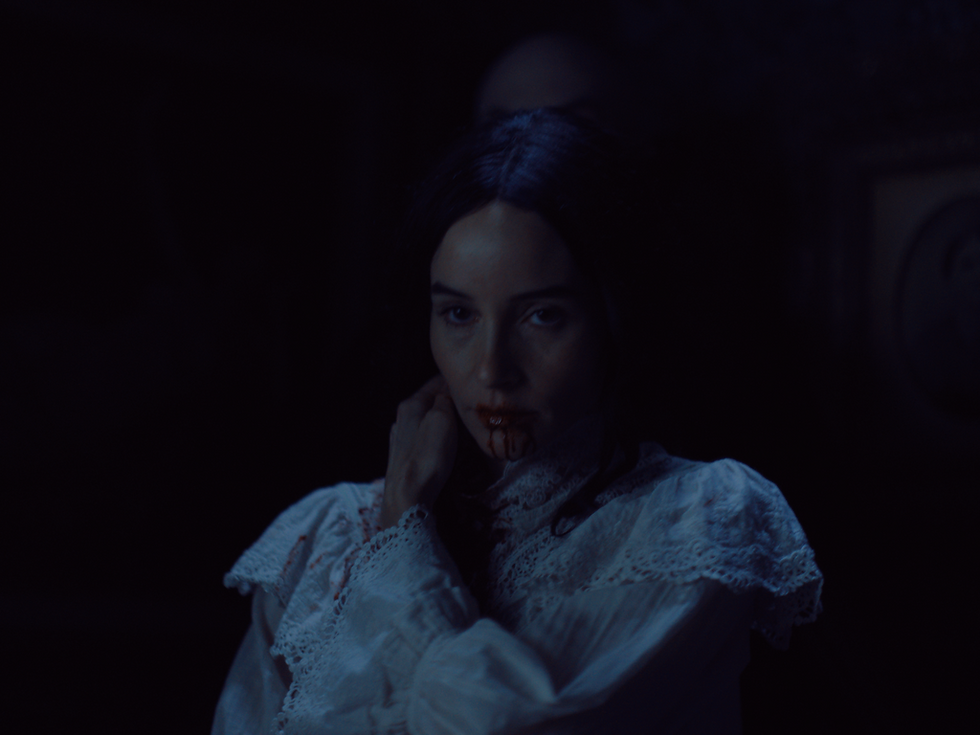Jocelin Donahue & Brady Hepner Talk ABRAHAM'S BOYS and Portraying a Fractured Family
- Jul 17, 2025
- 4 min read

By Shannon McGrew
In Natasha Kermani's (Lucky, Imitation Girl) latest film, ABRAHAM'S BOYS, based on the short story by Joe Hill, we meet Max (Brady Hepner) and Rudy Van Helsing (Judah Mackey), who have spent their lives under the strict and overprotective rule of their father, Abraham (Titus Welliver).
Unaware of his dark past, they struggle to understand his paranoia and increasingly erratic behavior. But when they begin to uncover the violent truths behind their father's history with Dracula, their world unravels, forcing them to confront the terrifying legacy they were never meant to inherit.
For the release of ABRAHAM'S BOYS, Creepy Kingdom's Shannon McGrew spoke with actors Jocelin Donahue and Brady Hepner, who play mother/son duo Mina Van Helsing and Max Van Helsing. During our chat, we discussed everything from their approach to portraying a fractured family to collaborating with director Natasha Kermani and why vampire stories continue to resonate.
Thank you both for taking the time to speak with me today. The bond between mother and son feels grounded in love, yet there's an underlying unease. How did you both approach capturing that complexity on screen?
Jocelin Donahue: Max kind of always belonged to his father and has always been more brought up and indoctrinated into his beliefs, and that he kind of has these old-world mentalities that we're imposing on him. There's this kind of push and pull between Max and Mina; there's some distance there because of the hold that Abraham has over him. Mina is a loving mom and also wants to protect them from this evil that she believes in. It's certainly a dysfunctional household.
Brady Hepner: Max is this obedient soldier to his father, who's almost a commander-like father. Whatever Abraham says, Max does, and throughout his life, he's really not experienced anything other than that. So Max feels this loving side from Mina. It's a relationship he wants to have with her, but it's not a possibility due to basically his work as a soldier for his dad.

What was it like working with director Natasha Kermani, especially during some of the scenes that required heavier emotional loads?
Brady Hepner: For me, it was great because we would always collaborate before the cameras were rolling. I'd have my list of ideas, and she'd have her list of ideas, and we'd come together and brainstorm before the camera started rolling. It was cool for me to see what the eyes behind the camera wanted. Having what she wanted and what I wanted, it was relatively easy to combine them and deliver something that we were both happy with and that honored the story.
Jocelin Donahue: I'll second that. Natasha is a great collaborator, and the environment she creates on set is one of open exchange of ideas. She's always pulling ideas from every department, and she's very present and aware, with a remarkably high emotional intelligence. However, she's also a pragmatic and direct person, which is helpful when working with a director.
While Dracula's lore lingers in the background, the story is ultimately about family. What message do you think it conveys about the personal cost of protecting loved ones at any price?
Jocelin Donahue: That's what's really scary about this movie, the logical end of where paranoia leads. Children don't have a broader perspective to draw from, especially in an isolated farmhouse in 1915. They're only learning about things from us, and they don't have a chance to have any context broader than that, so it can be very damaging to believe something so strongly.
Brady Hepner: Jocelin said it perfectly. Keeping your family safe at all costs on paper is a great quote to live by until the person who is keeping everybody safe is heading into this delusional state. Then they start to drag everybody down with them. It's really what the intention is behind the so-called leader.
Vampires have been a part of cinema for decades. What do you think keeps audiences coming back to these stories?
Brady Hepner: There's such a mystery behind it. You don't really know what's going to happen with each vampire story. I think the fact that there's no direct storyline with each film keeps the audience guessing, which is really what you want out of a story, so that's why I think over time, they keep doing so well.
Jocelin Donahue: It's this framework that you can map your horror story ideas onto. All the lore that you get to pull from all the great characters, the ideas about turning skeptics into believers, the ideas of good versus evil, the ideas of coming together to solve a mystery, there are all these entertaining elements about vampires and Dracula. It's why it's so interesting that there are so many properties, stories, and movies about them. They are woven into our human culture.
ABRAHAM'S BOYS is now in theaters.



